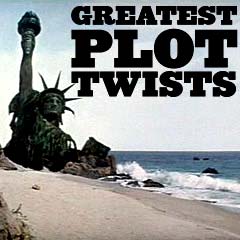
|
|
|
|||||||||||||||||||||

|
Pandora's Box (1929, Ger.) (aka Lulu or Die Büchse der Pandora)
Director Georg Wilhelm Pabst's early erotic and hypnotic silent film melodrama produced hateful critical reviews for its overt sexuality. Throughout the film, Louise Brooks portrayed a tempting goddess named Lulu wearing silky dresses and billowy gowns, even though she sported a pageboy haircut (or black bob). The insatiable, free-spirited yet innocent 18 year old cabaret chorus girl and femme fatale Lulu (Louise Brooks) was caught in various scandalous situations:
On her wedding day to Dr. Schon (Fritz Kortner), Lulu's husband-to-be found her cavorting with two other men: Schigolch (Carl Goetz) (either Lulu's pimp or father?) and Rodrigo Quast (Krafft-Raschig), a trapeze performer (and future blackmailer). She even was starry-eyed with Schon's son Alwa (Franz Lederer) who professed: "I can't live without you any longer." In a rage, Schon commanded Lulu to shoot herself, but ended up dead himself when the gun accidentally discharged. In the concluding trial scene in the case of Schon's murder, Lulu was accused of manslaughter. The prosecutor compared the hedonistic Lulu (wearing a black veil) to a Pandora's box of evil. Destined to be punished, the expressionistic finale on Christmas Eve found Lulu as a destitute prostitute in London's Soho district. She became another gleaming-knifed victim of 'Jack the Ripper' (Gustav Diessl) during an erotic embrace and kiss. He could not resist stabbing her. Lulu's hand went limp to indicate her death after the knifeblade was stuck into her stomach - off-screen.
|
   Jack the Ripper (Gustav Diessl) and Lulu (Louise Brooks) |
|||||||||||||||||||

|
Pandorum (2009)
Set in space, this derivative horror film by director Christian Alvart and producer Paul W. S. Anderson was a lengthy creature-feature. The title of this post-apocalyptic sci-fi film actually referred to a medical, physical and psychological disorder (fictional), aka the ODS (orbital dysfunctional syndrome) - a paranoid-hallucinatory insanity experienced by astronauts in deep space.
Its setting was many years into the future onboard a sleeper cargo ship, an inter-stellar ark named Elysium. The vessel (with astronauts and cargo in a state of hypersleep) was traveling in the year 2174 AD from an overpopulated Earth (with limited resources) to colonize Tanis, the only Earth-like planet known to exist. Their ship's cargo was composed of 60,000 humans in hypersleep-pods, who were to be colonized on the distant alien planet. (When Earth was obliterated 8 years later, a message was beamed to Elysium's crew: "You're all that's left of us. Good luck, God bless, and Godspeed."). A rotating crew or team was shifted into duty as a unit every two years, to be in charge of the journey. There were only a few characters, basically Elysium's two main crew members, who were awakened from their extended hypersleep chambers after they had slept well past their wake dates. Due to the ship's malfunctioning, the crew members awoke extremely agitated, disoriented and unable to remember who they were and what their mission was:
Bower had a numbered tattoo on his arm indicating he had been assigned to Team 5 for the long journey (the trip would take 123 years). Payton and Bower realized that they were in a race-against-time in the seemingly-abandoned spacecraft. Access to the bridge was shut off. The ship had an unstable reactor, sending out deadly and destructive power surges, and they needed to reset the reactor. Bower (with Lieut. Payton remaining behind to guide him via radio transmitter) ventured out with a flashlight-glowstick through a small air shaft into the ship's seemingly-abandoned, claustrophobic, dark corridors. After a panic attack in the air duct, Bower seemed to acquire symptoms of the disease Pandorum. The now psychotic and semi-insane Corporal encountered cannibalistic tribal creatures that had infested the ship - strange, pale, hairless, fast-moving, warrior zombie-like humanoid beasts with blue lights who used bladed weapons and lassos to catch and murder their human prey. They also trapped their victims in hook and pulley systems.
In Bower's journeys to search for his wife (although it was later revealed that after she left him, he enlisted for the flight), Bower came upon a number of different survivors and/or enigmatic figures:
Payton was also joined by another enigmatic figure, who claimed he had come from the bridge:
Simultaneously telling the same story although with different interpretations, both Leland and Gallo described the following:
After Bower reset the reactor and power was restored to the ship, many of the humanoid creatures (descendants of the exiled passengers) nesting under it and aroused to attack were fried, although Manh's throat was slit by a mutant child during a chase back to the bridge. Gradually, more of the film's twist was revealed -- 'Payton' was actually Gallo. When Gallo went back to the hyper-sleep pod, he had mistakenly crawled into Payton's pod. The Pandorum-afflicted 'Payton'/Gallo was interacting with a younger hallucinatory version of himself (as he looked when he first started working on the ship). 'Payton'/Gallo was the crazed "God" from Leland's story. Now to their horror, they realized that the Elysium had been on the destination planet of Tanis for 923 mission years (according to the ship's log). It had crash-landed on Tanis and had been lying underwater in the alien world's ocean for 800 years. Bioluminescent ocean life was viewed through the windows. Struggling not to go insane himself, Bower fought against 'Payton'/Gallo, and he and Nadia escaped to Bower's hibernation pod, while Payton (in the captain's chair) and the mutant creatures were drowned as water rushed into the Elysium's bridge from a break in the glass wall. Nadia and Bower were jettisoned to safety, to the surface of the ocean near land. Because of the breach in the hull, all of the ship's remaining escape pods were also jettisoned to the surface as part of a pre-programmed emergency evacuation plan, and the remaining civilians began to wake up in the pods. The view zoomed back from the water surface (scattered with pods) on the planet of Tanis.
The final shot was a view of the two-moon planet Tanis. Titles appeared displaying that life was beginning again: "Tanis Year One " was followed by the small number of survivors in the alien planet's population in its first year: "Population 1213..." from an original 60,000. |
 The Year 2174, the Elysium Space Ark  Gallo (Ben Foster) - Commanding Ship in Film's Opening Scene   Corporal Bower (Ben Foster) Awakening in Pod - in Agitated State   Lieut. Payton (Dennis Quaid) Awakening From HyperSleep  Zombie Creature  Nadia (Antje Traue)  Leland (Eddie Rouse)  Manh's (Cung Le) Throat Slit by Mutant Humanoid Child  Mutant Humanoid Child  Payton Speaking to Gallo - Himself   'Payton' Speaking to, Hallucinating and Fighting His Former Self Gallo  Breach in Hull - Water Poured Into Bridge on 'Payton'/Gallo in Captain's Chair, Drowning Him |
|||||||||||||||||||
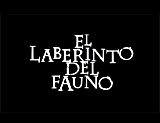
|
Pan's Labyrinth (2006, Sp./Mex./US) (aka El Laberinto del Fauno)
In this wondrously imaginative World War II era fantasy film set in Spain during fascist Franco's regime, young Ofelia (Ivana Baquero) was brought with her pregnant mother Carmen (Ariadna Gil) to live with her adoptive stepfather, malevolent and brutal Spanish fascist Captain Vidal (Sergi López). To escape the tough realities of wartime, Ofelia sought refuge in an imaginary escapist world in a forest home filled with fairies and a menacing faun named Pan (Doug Jones), who was located at the center of the labyrinth. The film concluded with the unexpected death of Ofelia at the hands of her own stepfather. Her murder occurred as she fulfilled the third of three challenging tests given to her by Pan to prove that she was the true Princess of the underworld. When she brought her newborn brother (her remarried mother died in childbirth) to the center of the labyrinth maze and presented him to Pan, she was told that she must shed the blood of an 'innocent' - her baby brother. When she refused (interpreting that the innocent was the baby), she was shot in the stomach by the Captain, who demanded the child. She fulfilled the test however, when her own blood dripped down and opened the portal.
Ofelia was transported to the underground realm. She was seen dressed in gold joining her dead mother Carmen/Queen and actual father, the underworld King (Federico Luppi), in the land of the fairies' throne room. She was applauded as the long-lost Princess Moanna, whose soul had returned. She died believing that she had successfully completed the three tasks and achieved immortality. Pan spoke the last lines of the film, in voice-over:
|
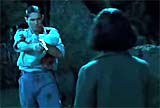  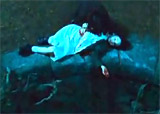 Ofelia Murdered by Her Stepfather - The Blood of an Innocent  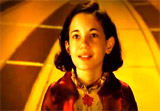 Ofelia in the Underground World |
|||||||||||||||||||
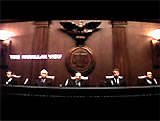
|
The Parallax View (1974)
This Alan J. Pakula political thriller paralleled the JFK assassination to some degree and was made during the Watergate era. Its tagline was: "As American as Apple Pie." As prominent US Senator Charles Carroll (Bill Joyce) from California (and aspiring Presidential candidate) was delivering a speech ("I've been called too independent for my own good") in a room atop Seattle's Space Needle on Independence Day, he was gunned down. There appeared to be two red-jacketed waiters with guns, both employed to help cater the event, involved in the murder. One of them closer to the podium (who was set up or framed) was chased to the roof, where he was wrestled by three men and rolled off to his death, while the second waiter - the real assassin (Bill McKinney) further back was unnoticed. Among the many witnesses to the assassination was TV newswoman Lee Carter (Paula Prentiss). After the murder, a government commission, the Carroll Commission, investigated the case for four months and held nine weeks of hearings. It declared the killing the work of a "lone gunman" - who was identified as waiter Thomas Richard Linder (Chuck Waters), with "no evidence of any wider conspiracy, no evidence whatsoever." Linder's motive was declared to be "a misguided sense of patriotism and a psychotic desire for public recognition." Three years later, newswoman Lee Carter visited her colleague - investigative newspaper reporter Joe Frady (Warren Beatty), who was also there the day of the assassination. Frady was known as a rogue reporter - who was often accused of "creative irresponsibility" - making news rather than just reporting it. She expressed fears that six of the witnesses to Carroll's death (out of eighteen) had suspiciously died in accidents. She was terrified that she was next: "Somebody's trying to kill me...These people were killed. And whoever killed them is going to try to kill me." She had been talking to Senator Carroll's former aide Austin Tucker (William Daniels), who believed there was a conspiracy. Frady thought there were only four deaths and described the circumstances, although two more had passed away recently:
In the next scene, Carter was dead - of a suspicious drug overdose. Frady spoke to his friend Will (Kenneth Mars), a former FBI agent, who was knowledgeable about ways to commit murder without suspicion. Frady asked for an alias name and ID (for a "hostile misfit") for his future casework, and was given the proposed name of "Richard Partun" - an actual criminal-type. Frady decided to visit the town of Salmontail where Judge Bridges had died while fishing near a dam. The Sheriff L.D. Wicker (Kelly Thordsen) attempted to drown Frady at a dam the same way that Bridges had died, by opening the dam's floodgates while holding a gun on Frady fishing in the water. But Frady slashed the Sheriff with his fishing rod, and they struggled together in the rapidly-flowing water - where the Sheriff drowned. Later, in the Sheriff's house in a drawer, Frady found evidence that the Sheriff had been recruited by the shadowy Parallax Corporation. There was a personality questionnaire, an entrance exam designed to point out anger, violence, frustration, and possibly homicidal characteristics in potential recruits. The Human Engineering Training Institute in Los Angeles seemed to be seeking political assassins - so there was the real possibility of a political conspiracy. Frady sensed that "who's ever behind this is in the business of recruiting assassins." While Frady was visiting Austin Tucker, a bomb blast exploded the aide's boat - Tucker was killed, while Frady was believed dead. Going undercover ("I'm dead and I wanna stay that way for a while"), he assumed an alias name ("Richard Paley"), and was contacted for recruitment by Jack Younger (Walter McGinn) as the right kind of aggressive candidate needed by Parallax. Younger said he would receive a finder's fee for the enrollment. At Parallax, Frady watched a 'brainwashing' slide show collage, an Assassin Training Montage, of non-verbal visual images juxtaposed with white-on-black words such as "Love," "Mother," "Father," "Me," "Home," "Country," "God," "Enemy," and "Happiness" (words were repeated, the tempo increased, and the images became more violent). Frady attempted to portray himself as a disaffected social misfit in order to penetrate their organization and be hired on as a political assassin. After being enrolled at Parallax, Frady/"Paley" alerted authorities on a Globe Airlines Boeing 707 plane after it departed from a Los Angeles-area airport bound for Denver. He was able to prevent the assassination of Senator Gillingham (Robert P. Lieb) on the airplane with a planted bomb in baggage (it was planted by the killer of Senator Carroll at the Seattle Space Needle). The plane was turned around and unloaded before the bomb exploded. When "Paley" returned to his room, Younger questioned his fake name. Frady was forced to provide his real name - he offered "Richard Partun." He claimed that using his real name was making it difficult to find work, since he was previously arrested for drunkness and indecent exposure. Frady/"Partun" - was deemed the perfect anti-social personality. He was assured he would be hired for security work. Unfortunately, Parallax was already suspicious of Frady's intentions, and his editor Bill Rintels (Hume Cronyn) was poisoned to steal some of Frady's secretly-recorded tapes with Younger. Frady became fully aware -- after it was too late -- that he was being framed and set up by the company to take the fall for another similar assassination - this time it would be the murder of Senator George Hammond (Jim Davis) in a convention hall during a dress rehearsal for a political rally. Frady tailed three other Parallax operatives (posing as security officers) in the convention hall's upper rafters as the rally's run-through was in progress. By film's end, Frady was implicated in the killing of Hammond, who was shot as he drove himself in a cart away from the podium. At Frady's feet was a planted, unused gun, and as he fled from the scene, people saw him and assumed that he was the assassin: "There he is!" When he ran for the door exit, he was gunned down by a blast from a shotgun pointed at him by the real unseen assassin (Bill McKinney) - the same Parallax assassin responsible for the attempted murder of Senator Cunningham, and the murders of Senator Carroll, Bill Rintels, Senator Hammond - and probably many others.
The Hammond Commission (as it did at the film's opening), after an investigation of six months and 11 weeks of hearings, officially reported that Frady had blamed Senator Hammond for killing Senator Carroll - and had sought revenge:
Frady was declared the lone assassin of Hammond, and again it was declared:
|
 Senator Carroll Before Assassination  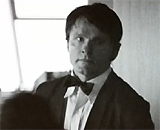 The Real Killer: The 2nd Waiter (Bill McKinney) 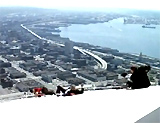 Death of the "Killer" at the Space Needle 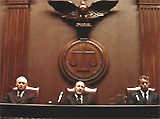 Report of the Carroll Commission 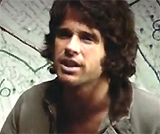 Joe Frady (Warren Beatty) 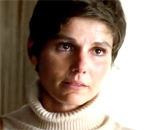 TV Newswoman Lee Carter (Paula Prentiss) 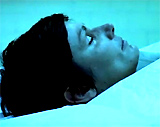 Carter Dead 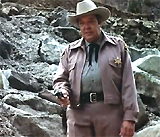 Sheriff L.D. Wicker (Kelly Thordsen) Confronting Frady 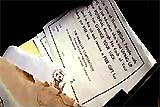 The Parallax Institute in Los Angeles 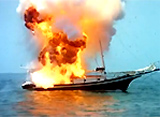 Boat Blast Killing Austin Tucker 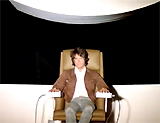 The Parallax Montage 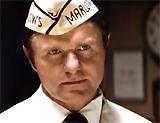 The Parallax Assassin (and Bill Rintels' Killer) |
|||||||||||||||||||

|
Passengers (2008, US/Can.)
Director Rodrigo Garcia's long, drawn-out, suspenseless and pretentious mystery thriller, with only a limited theatrical release, gave hints of its fairly-obvious, common and derivative plot twist (similar to The Sixth Sense (1999)) in its three taglines:
In the moody melodrama, highly-educated young grief therapist/counselor Dr. Claire Summers (Anne Hathaway) received a late-night phone call and vowed she was "wide-awake." She was appointed to work with five traumatized plane crash survivors (on a commercial airliner carrying 109 passengers with only a handful of survivors) who had differing accounts of their near-death experiences. Four were engaged in group therapy with her to reconstruct and re-visit the events of the incident, while one of them received individual attention:
The patient treated privately was an enigmatic, handsome, charming but slightly creepy and secretive male patient named Eric Clark (Patrick Wilson), a VP at a brokerage firm - Claire's love interest. She at first played hard-to-get and claimed their growing relationship was a conflict of interest, although she crossed an ethical line and made love to him - and then blurted out: "I'm a mess." The New Sky Airlines flight had crashed on a nameless beach near Pinewood (in the state of Washington?), a city with overcast gray skies. Claire became very suspicious that the crash wasn't caused by pilot error but by a covered-up engine explosion and mechanical system failure (the film's conspiracy theory angle). Characters became sinister as Claire's patients began to disappear or go missing, while persistent airline representative Mr. Arkin (David Morse), who argued for human error, began to follow survivors and Claire. She feared the missing patients had been targeted by the airlines. As Claire began to become unhinged herself, friend Mr. Perry (Andre Braugher) told her:
On the porch of her estranged older sister Emma's (Stacy Grant) house, Arkin told her that the flight had no survivors: "They're dead. They are all dead" - and then admitted that he was the dead co-pilot. The pilot of the plane, claiming he was tired (he was in the midst of a divorce) left the cockpit to the co-pilot:
In Arkin's pilot log book left behind, she found the computer print-out of the passenger list - with her name on it. She was the seatmate of Eric during the flight. All of her contacts over several weeks, including Eric, her Aunt Toni (Dianne Wiest), and teacher Mr. Perry, had been "ghosts." Eric explained they had counseled her to make peace with her situation and to help her move on:
The film ended with Emma and her husband entering Claire's empty apartment after the crash, where they found a note that she had written to help reconcile with her: "Emma, You are my sister. My life is incomplete without you." |
 The Airplane Crash  Psychotherapist Dr. Claire Summers (Anne Hathaway)  Dr. Summers with Eric (Patrick Wilson)  The Computer Print-Out of the Passenger List  Anne Was a Passenger, Seated Next to Eric  Co-Pilot Arkin (David Morse)  Anne's Final Note |
|||||||||||||||||||

|
Perfect Stranger (2007)
Director James Foley's neo-noir psychological erotic thriller was filled with lots of red herrings and non-clues, and characters who were hiding secrets. However, there were some obvious clues early on as to the twisting film's plot that was unraveled in the blind-siding, surprise conclusion. The hints were numerous:
Rowena "Ro" Price (Halle Berry) was an investigative, muckraking journalist for the New York Courier tabloid newspaper, writing under the male pseudonym David Shane. She published a story about an anti-gay rights, closeted Republican US Senator Stephen Sachs (Gordon MacDonald) who was found to be having a homosexual affair with a male intern. Rowena became disillusioned and bitter after a cover up (by a presumed pay-off to Rowena's editor). Rowena was in the midst of quitting when at a subway station, she had a chance meeting with childhood friend Grace Clayton, known for being promiscuous. They spoke of Grace's recent fling with Manhattan ad agency magnate Harrison Hill (Bruce Willis), a charming, womanizing boss. After they met online (Grace took the screenname Fast Filly) and had passionate sex, Grace was dumped by Hill when he began sleeping with other women. Rowena was told of Grace's recent betrayal by Hill. Grace vowed to get revenge against him:
Grace planned to have Rowena publish Hill's steamy emails. The disclosures were designed to inform Hill's covetous, ultra-jealous rich "Armani wife" Mia Reinhart-Hill (Paula Miranda) to get even ("She finds him cheating, she and her money are out the door"). Grace handed over a stack of Hill's steamy emails to Rowena to publish - but Grace soon turned up dead in a river. She had been poisoned with belladonna (dilation medicaton), also had her eyes burned out with it, and she was pregnant in her first trimester! Rowena decided to take up this even bigger scandalous case -- to investigate the suspected Hill as the brutal killer of her friend Grace. To look further into Grace's grisly murder, Rowena teamed up with her former co-worker, researcher and computer whiz Miles Haley (Giovanni Ribisi), became a temp named Katherine Pogue, and went undercover at Hill's company. Her objective was to try to find clues to pin Grace's murder on him. At night, she went online to chat with him (with screenname Rocketgirl). [Note: She was not aware that she was actually online with an infatuated Miles!] She wanted to connect and prove that the screenname ADEX was his - the one Hill used with Grace. Hill had hired long-legged, brunette lesbian assistant "watchdog" Josie (Daniella Van Grass) to organize and police his affairs, and to prevent the loss of the fortune he shared with his rich wife Mia, if she learned of his sleeping around. Josie warned Rowena to stay away from Hill. The film summed up all of the various secrets that the two main characters had:
In the film's ending, seen in a flashback, Ro's mother struck the stepfather with a fire poker and killed him, and the two secretly buried his body in the outdoor yard. Everything was witnessed by young Grace at a nearby window, who then went on to blackmail Rowena for the rest of her life. That was Rowena's motive to kill her. Rowena set up Hill for the murder of Grace. She was successful in framing Hill and convicting him - he was put on trial and found guilty. Rowena had sealed his fate by putting traces of Grace's hair, secretions and blood (commingled with belladonna) in Hill's car (Rowena had stolen the belladonna from the "pathetic" pharmacy where her ailing convalescent mother was being cared for, at Delano General). Belladonna was something that Hill would have had access to through his wife (it was stored in the medicine cabinet in the downtown photography studio). In the final reveal, through voice-overs and flashbacks, Rowena was shown to be Grace's murderess (she had poisoned Grace with a laced belladonna drink, to implicate Hill or his wife, and then disposed of her body in the river). To keep quiet, Miles attempted to blackmail Rowena into having sex with him ("What are you willing to do for me to keep me quiet?"). This reminded Rowena of the continuing blackmail that Grace had been using on her. Rowena stabbed Miles in the heart, and then made it look as if it was an attempted rape and murder due to self-defense. She called the police, informing them that maybe the wrong man had been jailed. She didn't know that the next-door neighbor had witnessed the stabbing - and the blackmailing chain would presumably continue.
|
 Rowena and Grace  Murdered Grace  Harrison Hill with Wife Mia  Hill's Screenname: ADEX  Rowena as Child  Retina Scans  Miles' Love Shrine to Rowena  Evidence of Miles' Sexual Encounter With Grace on October 5  Abuse of Young Rowena By Her White Father  Grace Witnessing Abuse at Window  Miles Stabbed in Heart by Rowena  Miles' Murder Witnessed by Next-Door Neighbor |
|||||||||||||||||||

|
The Perks of Being a Wallflower (2012)
In this coming-of-age dramedy set in the early 1990s, the main character was Charlie Kelmeckis (Logan Lerman), an introverted, shy and sensitive teenaged HS freshman who had been receiving treatment for clinical depression. He had also been recently traumatized when his best friend Michael committed suicide (by shooting himself) in May just before the summer of his freshman HS year. The withdrawn Charlie was apprehensive about finding friends as he began school in the fall. He became friends with two seniors and was involved in their social circle of self-described misfits:
When he was first noticed by them as a "wallflower," he responded: "I didn't think anyone noticed me." Charlie claimed he had some issues that he was still facing, although he had resorted to familiar coping mechanisms. He was regularly having disturbing flashbacks and blackouts. He also frequently wrote letters to a "friend." When he became close friends with Sam, she confided in him about how her first kiss occurred when she was molested at age 11 by her father's boss. Since then, she described her self-destructive dating habits: "You know Charlie, I used to sleep with guys who treated me like s--t. And, uh, get wasted all the time. But now, I feel like I have a chance. I could even get into a real college." He was able to freely admit to her (a memory that later changed) that his Aunt Helen (Melanie Lynskey) was also sexually-abused as a child: ("My Aunt had that same thing done to her, too, and she turned her life around...She was my favorite person in the world, until now"). Sam then wished that Charlie's first kiss would be with someone who loved him:
Then she leaned forward and kissed him, and they both expressed their love for each other. (Sam: "I love you, Charlie." Charlie: "I love you, too.")
Charlie was forced to face his past again when he found himself attracted to Sam, although she was dating a college student named Craig (Reece Thompson). Later in the film, Sam found out that Craig was cheating on her, and they broke up on prom night. On the night before she was leaving to attend Pennsylvania State University, Sam invited Charlie to her room to say goodbye. When they kissed, she touched his inner thigh - and it interrupted their romantic moment. It brought back a troubling flashback of his Aunt Helen - and Charlie suffered a nervous breakdown.
In the film's major reveal, Charlie's psychiatrist Dr. Burton (Joan Cusack) was able to release Charlie's repressed memories. He had been sexually-abused by his Aunt - who had also touched his thigh. He had repressed the memory because he blamed himself for her death. Subsequently, she had died in a car accident on Charlie's 7th birthday - Christmas Eve. (He confirmed his disturbing, repressed memory with his sister Candice (Nina Dobrev) on the phone when he began to contemplate killing himself):
In the conclusion, Charlie sought treatment and finally came to grips with his mental problems and issues. As a symbol of his recovery, as Sam had done before, he stood up in the back of the pick-up truck in the tunnel and extended his arms outwards - as he described his newfound happiness in life (in voice-over):
|
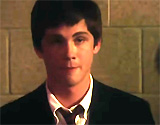
Charlie (Logan Lerman)  Sam (Emma Watson) and Patrick (Ezra Miller) - Noticing Charlie as a "Wallflower"   Sam Standing In Back of Pick-up Truck With Arms Extended During Drive Through a Tunnel - To the Radio's Playing of David Bowie's "Heroes"  Later Kissing with Charlie On Her Last Night Before Leaving For College  Interrupted Kiss When Sam Touched Charlie's Thigh   Flashback to Aunt Helen Touching Charlie's Thigh and Kissing Him ("We have our little secret, OK?")  Charlie's Nervous Breakdown  Charlie's New Found Love of Life: "We are infinite" |
|||||||||||||||||||

|
Phantasm (1979)
Director Don Coscarelli's imaginative, low-budget independent horror-sci-fi film was a sleeper film and soon became a major cult hit. Some of its elements were similar to Invaders From Mars (1953). Its tagline was:
It was followed by many inferior sequels, Phantasm II (1988), Phantasm III: Lord of the Dead (1994), and Phantasm IV: OblIVion (1998). The scarily-suggestive horror film introduced three major elements:
The film was set in the year 1978. In the opening shocking murder scene, teenaged Tommy (Bill Cone) was making out with a date - the attractive and sexy Lady in Lavender (Kathy Lester), with heavy purple eye shadow. They were lying on the ground and having sex outdoors at the Morningside Mortuary and cemetery. As he sighed, "That was great, baby," Tommy was stabbed to death in the chest with a long knife by his sex partner - her murderous face melded into the Tall Man's (Angus Scrimm) leering grin at the moment of death. However, the murder was ruled as a suicide. The death of Tommy had broken up a trio of males who were close friends, including:
Jody and Mike had just lost their parents - under mysterious circumstances, and Mike in particular was having chilling, surrealistic, dream-like nightmares (and experiencing a fear of abandonment). After the funeral for Tommy, Mike spied on (with binoculars) the pale-faced mortuary attendant - a sinister, arachnoid mortician-undertaker named the "Tall Man", with supernatural strength for a slim and gaunt individual. He watched as the mortuary attendant picked up the 500 pound coffin by himself and put it in the back of a hearse. Suspicious, Mike and Jody explored the Morningside Mortuary - a mausoleum managed by the Tall Man. They investigated with the help of ice cream vendor and friend Reggie (Reggie Bannister). The menacing, disturbing Tall Man appeared to be ordering fresh corpses, to be carried off by his enslaved army of shrouded, Jawas-like dwarfish creatures (or minions) - grave robbers. The corpses were resuscitated, then crushed (to conserve space) down to dwarf size, in order to be transported to another alien planet or world to be used for slave labor. There was a bridge or gateway between Earth and another world. Mike suspected that the Tall Man was responsible for his parents' deaths. The Tall Man haunted the Pearson boys with a flying metallic sphere or silver pin-ball that had deadly spring-loaded blades, that bore or drilled into the skulls of victims to extract or suck out their brains in a spray of blood. In the film's most memorable scene, the sphere implanted itself into the forehead of the graveyard's grounds-keeper and then spewed out blood. The two boys were left to defend mankind against these forces of Evil. Their plan was to trap the Tall Man inside a deserted mine shaft. The evil Tall Man fell into the shaft, and was covered over with large boulders. However, in the twist ending, it was all revealed to be Mike's nightmarish dream, as he awoke during a thunderstorm, and soon was talking to friend Reggie in front of a roaring fire. In the interim, Mike's brother Jody had died in a car wreck two weeks earlier:
And then somehow in the conclusion, the Tall Man materialized in Mike's bedroom - seen in a reflection on a full-length door mirror. The Tall Man menacingly called out: "Boy!" - and a pair of large hands from one of the Tall Man's minions (a dwarf) grabbed Mike's head and pulled him into and through the shattering mirror - an ending similar to the shock finale-epilogue of A Nightmare on Elm Street (1984). |
 The Tall Man (Angus Scrimm)   Mike's Binoculars View of Tall Man and Coffin  Flying Metallic Sphere     Tall Man's Cut-Off Fingers  Mine Shaft Conclusion  Mike Waking Up From Nightmare - Plot Twist    Tall Man in Mike's Bedroom, Snatched Through Mirror |
|||||||||||||||||||

|
Phone Booth (2002)
The dramatic action in this Hitchcock-like suspenseful thriller by director Joel Schumacher, occurring in real-time, took place almost entirely in and around a mid-town New York City phone booth (at 53rd and 8th - symbolic of the mind of the main character). The movie deftly displayed split-screens and small cutaway boxes. Some were outraged that a spoiler revealing the film's ending - the real bespectacled killer - was displayed on the DVD's cover (the film's tagline: "Your Life Is On The Line"). Arrogant, hustling, wheeling-and-dealing, slick hot-shot NY publicist Stuart Shepard (Colin Farrell) was married to pretty blonde Kelly Shepard (Radha Mitchell), although cheating in his mind. He was planning to sleep with "favorite client" Pam McFadden (Katie Holmes), an aspiring young brunette actress. As he was placing a call to her at work in a public phone booth (to avoid detection from Kelly who checked his cell phone records), Stu was interrupted by a pizza delivery man (Dell Yount) offering him an already-paid-for "Half pepperoni, Half mushroom, Extra crisp" pizza, but Stu turned nasty, paid him $5 to leave, and refused the delivery. He again dialed Pam's number, as he often did at the same time every day from the same phone booth. They spoke briefly and he hung up when she refused a drink-date. Then when the phone rang, a Caller (Keifer Sutherland) revealed that he was watching from closeby and knew Stu's name. During a second call, the Caller described Stu's routine (of calling and lying to Pam), his girlfriend's name and number, and his wife's name and number. The mysterious Caller made Stu a hostage, and threatened him if he left the phone booth or ended the call ("Stu, if you hang up, I will kill you"). Using extortionist methods, the menacing, righteous Caller (after demonstrating his nearby whereabouts on a high-rise building with a silenced, high-powered sniper rifle with a scope, by blasting a toy robot) threatened Stu with murder if he didn't reveal the truth of his affair to both women. He explained Stu's sin that needed punishment: "You are guilty of inhumanity to your fellow man...It's time you learn, Stu. Deception can't go unrewarded." Police were called to the scene following the sniper's murder of a loud-mouthed, harrassing, baseball-wielding pimp named Leon (John Enos III) who was demanding to use the phone along with his three prostitutes. Police Captain Ed Ramey (Forest Whitaker) and other E.S.U. team members, officers, and an ambulance soon arrived at the scene. When Kelly also arrived, Stu was forced to confess to her his desire to 'f--k' Pam, and also tell the truth of all of his "crimes" to his assistant, his wife, and to Pam. After Ramey realized it was a sniper situation, they eventually traced the Caller/Shooter to the nearby, dilapidated Baltley Hotel building, where in room 604, they found the sniper rifle aimed at the street and a man who had bled to death after slashing his own throat. Meanwhile, police had fired their guns at Stu when he became distraught, grabbed the planted gun above the phone booth, and panicked - it appeared that he had been killed, but he was only hit with rubber bullets. The dead man in the building was revealed to be the pizza man, and Stu positively identified him as the Caller/Sniper. However, the twist was that the real Sniper/Caller was still alive. After Stu was placed in an ambulance and given a shot to relax him by EMTs, the real Caller/Sniper came over to the open door and spoke to a drowsy Stu - the final dialogue in the film. The Caller/Sniper let Stu live, but warned him to be careful and watch himself, before walking away (carrying a case with the broken-down sniper rifle):
Incapacitated, Stu couldn't alert the police although he tried to call out for help. The film ended with the Caller's voice-over: "Isn't it funny? You hear a phone ring and it could be anybody. But a ringing phone has to be answered, doesn't it? (Whispered) Doesn't it?" (The phone in the booth rang) (A man answered: "Hello?")
|
 The Pizza Delivery Guy (Dell Young)  Stu Shepard (Colin Farrell) in Phone Booth  Laser-Targeted by Caller  Pam McFadden (Katie Holmes)  Stu's Wife Kelly (Radha Mitchell)   Bloodied and Dead Pizza Man/Sniper?   The Real Caller/Sniper (Keifer Sutherland)
The Real Caller/Sniper (Keifer Sutherland) |
|||||||||||||||||||

|
Pi (1998)
Writer/director Darren Aronofsky's low-budget debut film was hauntingly Kafka-esque and tensely filmed in high-contrast, grainy and stark black and white, similar to David Lynch's Eraserhead (1977) with many close-ups. The surrealistic drama (with the tagline: "Faith in Chaos") opened with the voice-over rantings (with time stamps in military time) of a reclusive, white male named Maximillian "Max" Cohen (Sean Gullette) living in NYC's Chinatown in a walk-up apartment with multiple locks on his door. He told how he had almost blinded himself when he was six years old by staring into the sun - a resemblance to the myth of Icarus:
He was a brilliant mathematical genius who could solve multiplication problems in his head (a game he played with a young Chinese-American neighbor girl with a hand-held calculator named Jenna (Kristyn Mae-Anne Lao)). However, Max suffered from frequently debilitating bloody noses, tremors, severe migraine headaches, hallucinations and pain, and would often self-medicate with pills and injections, although he found them to be "failed treatments." He thought that the truth of the world could be summed up in mathematics. He would continually state his assumptions about the universe:
He obsessively worked on his computer, nicknamed 'Euclid,' to discover the stock market's formula or pattern that he assumed existed. He also whiled away the time by talking to elderly mathematics mentor Sol Robeson (Mark Margolis) while playing the Chinese board game of Go. When his computer crashed during computing, Max believed that the long digit-number string that Euclid had "spit out" on a print-out meant nothing, and discarded the paper in a trash-can. He also stomped on the motherboard after removing it. [Note: It was possible that his computer went dead because a wayward ant short-circuited the system.] He told inquisitive Sol about how 'Euclid' crashed and died:
But soon after, Max realized the numbers were actually accurate and predictive - and the key to decoding the stock market. Max spoke further with Sol about the 216 digit number, who cautioned that the world "can't be easily summed up with math. There is no simple path." Max stressed that the pattern in Go games was similar to the pattern in the stock-market or the Torah, although Sol warned him to be careful about making assumptions and becoming obsessive.
When Max restored his computer and rediscovered the full 216 digit number, his computer failed to print it, so he had to hand-write the long number string. He went back to Sol and accused him of lying. Sol confessed how he had discovered the 216 digit number, but felt it had been "a dead end":
Sol thought Max was driving himself over the edge of a cliff and going crazy ("You need to stop!"), and soon after suffered a second stroke (while resuming his own search for Pi). As Sol predicted, Max was increasingly becoming insane. He thought that two groups were threatening and pursuing him for his mathematical knowledge and the numbers in his head - the two groups were represented by:
To end his insanity, Max destroyed his computer, then took an electric drill to the right temple of his shaved head, spraying blood onto his bathroom mirror, with self-inflicted brain surgery. In the last scene set at a park bench, Jenna again asked him a mathematical problem ("How about 255 times 183? I got it! I got it! What's the answer?"), but he could only shake his head, smile, and blissfully and ignorantly ask: "I don't know. What is it?" She answered, "46,655. See?" When she asked another question: "How about 748 divided by 238. I got it! What's the answer?", he only looked up at the beauty of nature seen in the sun coming through tree leaves.
|
  "Max" At His Computer in NYC Apartment   'Euclid's' Printout of a 216 Digit number  The Handwritten Number   Max - Drilling Into His Own Head   Max After Sabotaging His Own Brain |
|||||||||||||||||||
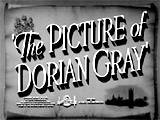
|
The Picture of Dorian Gray (1945)
Writer-director Albert Lewin's black and white occult-horror fantasy drama was based upon Oscar Wilde's 1890 story about a man's soul, its pursuit of youth and beauty, and its final evil destiny. It told about the fate of healthy, handsome, and young 19th century Victorian Englishman:
He posed for talented painter Basil Hallward (Lowell Gilmore) for a painting of his own portrait, while being corrupted by Lord Henry Wotton (George Sanders) who encouraged Gray to seek hedonistic pleasure. He jealously spoke to the colorful painting - offering to "give my soul" if he could stay young forever and never grow old. He made his offer in the presence of an Egyptian statue. The wish appeared to come true, as the painting aged gradually. Shocked by its slow transformation as Gray become more heartless and sinful, Gray locked the painting away in his schoolroom attic. Over time, Gray remained youthful looking, although the picture disclosed his real evilness and corruptive life. The film concluded with the sudden and shocking final view of the hideously-aged painted portrait of the demonic Dorian Gray (again shown in Technicolor). It showed the ravages of debauchery, sin and withered aging (while he remained young, vain and handsome) in real life. Although Basil attempted to warn his friend Dorian about reforming his life (after getting a brief glimpse of the changed portrait), Gray murdered Basil by stabbing him in the back with a knife, and hid his body in the room with the painting, before he was able to blackmail Allen Campbell (Douglas Walton) into secretly disposing of the corpse. In the last scene when Dorian faced the ghastly painting, he stabbed the heart of his image in the picture to release his awful visage and the spell that had been cast upon him, but he actually stabbed himself. He collapsed to the floor and as he died, he took on the hideous and deformed characteristics of the painting. The painting reverted back to its original depiction of Dorian as a young man (while a swinging lamp cast ominous shadows). When his body was discovered, it had taken on grotesque, monstrous features. |
  The Original and Aged Ghastly Painting of Dorian Gray  The Reverted Painting  Dorian Gray - With Deformed Characteristics of Painting |
|||||||||||||||||||
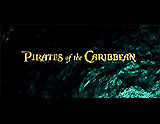
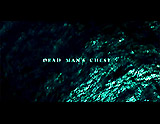
|
Pirates of the Caribbean: Dead Man's Chest (2006)
This pirate film by director Gore Verbinski, a fantasy swashbuckler, was the second in the series-franchise, about legendary Captain Jack Sparrow (Johnny Depp) of the ship the Black Pearl. The film opened with the interruption of the wedding of Will Turner (Orlando Bloom) to Elizabeth Swann (Keira Knightley) - and their arrest and sentencing - by Lord Cutler Beckett (Tom Hollander). They were arrested for aiding in the notorious Captain Jack Sparrow's escape. Beckett promised to free the imprisoned Elizabeth if Will would capture Captain Jack and return him with his magic compass. Shortly later, Elizabeth was able to escape and assist in Will's search. There was a wild quest throughout the film by the main characters for three important objects. Each of the characters had differing motives:
Sparrow owed a long-standing blood-debt to Davy Jones, the tortured-soul captain of the ghostly Flying Dutchman ship with a crew from hell. For Jones' earlier help in raising Sparrow's sunken Black Pearl and its crew, Jack had promised to give his soul to Jones in exchange, but time was running out. Captain Jack needed the key to the chest (with Jones' heart) to settle his debt to Jones - to avoid being doomed to eternal damnation and servitude to Jones in the afterlife. The chest was found buried on Isla Cruces, where it was recovered by Captain Jack and Elizabeth. At the same time, Will arrived with the key, planning to stab Jones' heart to free his father Bootstrap Bill (Stellan Skarsgård) (a crew member of the Flying Dutchman), not knowing that whoever stabbed Jones' heart became the next captain of the Flying Dutchman. In the end, Jones opened the chest, but found it was empty. His heart had already been delivered to Beckett. Jack was faced with two equally unappealing alternatives:
Sparrow, who was tricked by Elizabeth with a kiss, was left to his doom tied to the Black Pearl's mast. Then, he and the Black Pearl were swallowed by the Kraken, and taken to Davy Jones' locker inside the gateway, called World's End. In her shack, priestess Tia Dalma (Naomie Harris), with the power to resurrect the dead and see into the future, met with the Pearl's survivors in the film's conclusion:
She asked what they would do to save Jack from the afterlife, at World's End:
When they answered affirmatively that they would help rescue Jack, she told them:
The film's surprise ending occurred when heavy footsteps and the sight of boots descending stairs were viewed - Tia Dalma had called upon resurrected Captain Barbossa (Geoffrey Rush), the former captain of the Black Pearl (who had died in the first film) to assist and guide them. Barbossa entered the room and asked: "So tell me, what's become of my ship?" - he bit into a green apple, laughed heartily, and the monkey on his shoulder screeched as the film abruptly ended. There was a post-credits view of the crew's dog, earlier left behind on the island, crowned as the new chief of the cannibal tribe. |
 Priestess Tia Dalma (Naomie Harris)  Bootsteps on the Stairs  The Astonished Group The Astonished Group   Resurrected Captain Barbossa (Geoffrey Rush) |
|||||||||||||||||||

|
Pit and the Pendulum (1961)
Legendary director Roger Corman's and AIP's low-budget Gothic horror films included a rash of Edgar Allan Poe film adaptations (or variations) - this one (the second of eight) was based on Edgar Allan Poe's 1842 short story; it was preceded by House of Usher (1960), and followed by Premature Burial (1962), Tales of Terror (1962), The Raven (1963), the Poe-titled poem but H. P. Lovecraft adapted The Haunted Palace (1963),The Masque of the Red Death (1964) and The Tomb of Ligeia (1964) - this effectively-scary and suspenseful film (with great atmospheric effects) was the most financially successful of all the AIP Poe films:
|
 The Ominous Seaside Medina Castle  Elizabeth's Burial Plate (1517-1546) in Stone Wall of Dungeon  Portraits of Nicholas' Father Sebastian (r) and His Uncle Bartolome (l)  Elizabeth's Portrait  Nicholas' Tour of Dungeon Area  View of Underground "Torture Chamber" Where Elizabeth Died  Nicholas' Flashback: Painting Elizabeth's Portrait  Flashback: Elizabeth's Death in Nicholas' Arms  Flashback: Young Nicholas Spying on His Father  Flashback: Sebastian's Murder of His Adulterous Brother Bartolome and His Incestuous Wife Isabella  Nicholas - Haunted by Elizabeth's Dead Spirit  Elizabeth's Slashed Portrait in Her Bedroom 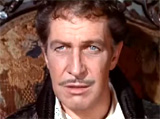 Nicholas: "I must accept whatever vengeance Elizabeth chooses to inflict upon me"  Nicholas: Descending The Passageway to Elizabeth's Opened Tomb  Elizabeth's Bloody Hand Emerged From the Opening Coffin   Elizabeth - Resurrected!   Francis - Gagged on Slab and Below the Razor-Edged Pendulum |
|||||||||||||||||||

|
This film's iconic, chilling, startling, twist-surprise ending has become common knowledge. Stranded American astronaut George Taylor (Charlton Heston), having escaped from enslavement and imprisonment by talking civilized apes, rode on horseback down a beach shoreline in the Forbidden Zone with mute primitive human Nova (Linda Harrison) behind him. He suddenly stopped when he saw something, and dismounted to stare upwards.
As the camera panned toward Taylor, through a spiked object, he had two major reactions; he first exclaimed:
But then he sank and dropped to his knees: "We finally really did it." He pounded his fist into the sand and railed against Earth's generations almost 2,000 years earlier that had destroyed his home planet's civilization with a devastating nuclear war, and that apes had become dominant on Earth.
The full object came into view as the camera panned backward - the spiked crown of a battered Statue of Liberty buried waist-deep in beach sand. In a final shocking revelation, the full object came into view as the camera panned backward - it was the spiked crown of a battered Statue of Liberty that was buried waist-deep in beach sand, signifying that Taylor was still on Earth! The end title credits played without musical accompaniment; the only sound was the ever-present rhythmic waves pounding the shore. |
 "Oh my God!" 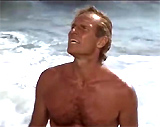 "I'm back. I'm home. All the time, it was..."  "We finally really did it. You maniacs! You blew it up! Ah, damn you! Goddamn you all to hell!" 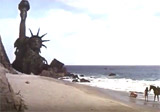 The Shocking Final Image |
|||||||||||||||||||

|
There was a bizarre, non-sequitur, and confused plot twist ending in Tim Burton's 2001 remake. The film's opening plot was set in the year 2029, and told about USAF astronaut Leo Davidson (Mark Wahlberg), during a space mission in the USAF space station Oberon. He boarded a spacepod cruiser on the Space Station for a "routine" reconnaissance mission to locate an earlier spacepod launch carrying a simian-chimpanzee named Pericles. During Davidson's journey, he was abruptly detoured through a space time wormhole or vortex that landed him on a strange planet ('of the apes'), named Ashlar in the year 3021, almost 1,000 years into the future. There, humanoid apes and humans were battling together. He was aided by sympathetic chimpanzee activist Ari (Helena Bonham Carter), and other humans, and was able to rebel against sinister General Thade's (Tim Roth) Gorilla Army and its main warrior, the second-in-command Attar (Michael Clarke Duncan). Davidson discovered a holy site of the apes in the Forbidden Zone, composed of a sacred temple and ruins. The apes who worshipped at the site called it Calima (or the temple of "Semos"). [In actual fact, Calima was composed of the crashed space station Oberon, that had originally launched Davidson from Earth. The name 'Calima' was derived from a sign reading: CAution LIve aniMAls. The space station crashed on the planet hundreds of years before Davidson did.] The Oberon's database log revealed that the original caged monkeys on board the Oberon spaceship, led by a ruling intelligent ape named Semos, had organized a violent mutiny and took control of the vessel after it crashed. The human commander had transmitted a message after they crashed: "This planet is uncharted and uninhabited. The apes we brought along have been very helpful. They were a lot stronger and a lot smarter than we ever imagined." However, it was noted by another commander that there were problems almost immediately, as ape society dominated the few humans who also survived:
The descendants of both the human survivors and Semos (and other apes) became the population of the planet, divided into two groups: human slaves and militaristic ape leaders (the lineage of Thade). In the film's ambiguous conclusion, the spacepod of chimp Pericles that was sent out during the original space flight of the Oberon (at the same time as Davidson's journey), landed in the society's midst. Pericles was worshipped as a god - his return was regarded as the arrival of Semos - the first ape. Hostilities between apes and humans vanished. Reusing Pericles' undamaged spacepod, Davidson went backward in time and returned to present-day Earth (?). He crash-landed in the reflecting pool of the Mall in Washington DC and ended up on the front steps of what he thought was the Lincoln Memorial. He walked into the monument and looked up at the giant statue of the President. To his amazement, he found that the familiar Lincoln statue in the memorial had been replaced by a statue of ruthless, sadistic commander-ape General Thade, with the inscription:
The world was dominated and populated by talking apes (had Thade beaten Davidson back to Earth?) with guns who swarmed around him in police cars and helicopters.
|
 Astronaut Leo Davidson (Mark Wahlberg) Returning to Earth in Spacepod  Splash-landing in the Reflecting Pool of the Mall and Careening onto Front Steps of "Lincoln Memorial"      Ape-Police  The Lincoln (General Thade) Memorial in Washington DC |
|||||||||||||||||||

|
The Player (1992)
Director Robert Altman's comedy-satire was about the murder of a disgruntled screenwriter (who was sending death threats by postcard), and its cover-up by a callous, insincere, back-stabbing, shallow, and egotistical Hollywood film producer. It covered the cut-throat politics of the movie industry, including sleazy deals for films to get made, and pressures brought to bear on studios and scriptwriters. The subtle opening and closing shots of this film revealed the underlying joke of the premise - the movie was a 'film-within-a-film' about how the film came to be. The famed opening provided a clue with the shot of a movie set getting ready to shoot the film, and the clack of the slate signaling the start.
It told about how sleazy Hollywood producer Griffin Mill (Tim Robbins) was being harrassed and blackmailed by a mysterious and vengeful screenwriter whose script he had presumably rejected. During an altercation in the Rialto movie theatre parking lot alley (in Pasadena) with the alleged scripter named David Kahane (Vincent D'Onofrio), Griffin killed him by drowning him in a small pool of water. To cover up the crime, Griffin made it look like a botched robbery of Kahane's car radio. At Kahane's funeral service, the eulogy was delivered, ironically, by the real, blackmailing scriptwriter named Phil (Brian Brophy). There, Griffin met and soon fell in love with Kahane's sexy, artist and painter Icelandic girlfriend June Gudmundsdottir (Greta Scacchi). The big shock in the film was that Griffin continued to get communications (calls, postcards, faxes, and murder attempts - including a rattlesnake in a box placed on the passenger seat in his car) from the scripter (Phil) - who had now become a stalker. Griffin had killed the wrong man. Griffin was suspected by police and lined up for identification, but the witness chose Detective DeLongpre (Lyle Lovett) as the killer. DeLongpre was the officer who was tracking Griffin, and strongly suspected him of the murder. Continuing to be a scheming and cut-throat Hollywood executive, Griffin decided to encourage new colleague Larry Levy (Peter Gallagher), a story executive/co-worker, to back a film script from two other scripters for a legal drama titled Habeas Corpus. Griffin was sure the film would be a flop, since it had no stars and had a depressing conclusion. His ulterior motive was to hurt Levy's reputation and future, and put himself in a position to save the studio by salvaging the film. And he did so, one year later, with a tacked-on upbeat ending and two major stars for the film. In the re-edited film seen during a screening, star Bruce Willis saved wrongly-sentenced co-star Julia Roberts from going to the gas chamber - she literally got away with murder (and so did Griffin!). As Willis carried Roberts from the execution chamber, she asked: "What took you so long?" - he responded: "Traffic was a bitch!"; the film's scripter Tom Oakley (Richard E. Grant) affirmed the change to Bonnie (Cynthia Stevenson), Mill's ex-girlfriend: "We reshot it, now everybody loves it. That's reality"; Larry Levy backed him up: "This is a hit. This is what we're here for" - and promptly fired Bonnie for disagreeing. In the film's clever and happy ending of its own, Griffin had succeeded in his plan to save the film Habeas Corpus, and was promoted to head of the studio. In the meantime, he had married June, and she was pregnant. As he drove home after work, he received a car phone call from Levy and the same mysterious psychotic scriptwriter ("I'm the asshole who used to be in the postcard business") for a new movie idea:
Griffin gave the writer a deal - with the stipulation that it must have a happy ending: "Can you guarantee that ending?...If you can guarantee me that ending, you got a deal." The Twist: The short pitch in the script was the same story as the plot of director Altman's entire film - the murder of a rejected scriptwriter by a Hollywood executive who literally got away with murder. As in the pitched script with a happy ending (and the re-edited film Habeas Corpus), Griffin - the studio executive - happily went home to his pregnant wife -- June (was she real or Griffin's fantasy?). The title of the pitched film was: The Player. Griffin was greeted by June, who asked: "What took you so long?" to which he replied: "Traffic was a bitch!"
There was a slight mocking of the audience with a subtle and faintly-heard: "Nyah, nyah, nyah-NYAH-nyah" sung by an infant in the score. |
 The Opening Image: The Clack of the Slate  Griffin Mill's Drowning Murder of Scriptwriter David Kahane (Vincent D'Onofrio)  Phil (Brian Brophy) Delivering the Eulogy at Kahane's Service - He Was The Real Blackmailing Scriptwriter  Griffin Mill (Tim Robbins)  June Gudmundsdottir (Greta Scacchi)  June and Griffin at Funeral   The Revised Ending of Habeas Corpus - Bruce Willis Saved Murderer Julia Roberts From Execution  The New Pitch - for a Script and Film Titled The Player |
|||||||||||||||||||

|
The Pledge (2001)
Director Sean Penn's pretentious psychological thriller/drama (symbolically similar to the Little Red Riding Hood tale) opened (and closed) with drunken, retired cop Jerry Black (Jack Nicholson) sitting outside his dilapidated, rural gas station/home, ravaged and ranting:
The image was superimposed with views of black crows flying above in a pale blue sky - the background for the opening credits sequence. Just before he retired, the gruesome murder of a little blonde girl with a red dress named Ginny Larsen (Taryn Knowles) was discovered in the snowy area around Reno, Nevada. Black, in the waning hours of his job, pledged his "soul's salvation" to the turkey farm-owning mother Mrs. Margaret Larsen (Patricia Clarkson) that he would find the killer. He wasn't satisfied when mentally unstable Indian Toby Jay Wadenah (Benicio del Toro) (with a criminal record for statutory rape) was arrested, cajoled to confess, and then suicidally blew his head off during the botched interrogation. After learning of two similar murders of blonde-haired little girls wearing red in a triangular area of Monash County, and having in his possession Ginny's hand-drawn picture of the tall, black-garbed killer (called "the Wizard") driving a black station wagon and offering small porcupines to her, he began to track clues and possible suspects in the surrounding crime area. He became friends with, and set up a surrogate family with abused single mother waitress Lori (Robin Wright Penn) and her 8 year old blonde daughter Chrissy (Pauline Roberts) - and eventually used the girl as bait for the pedophile child killer. This caused Lori, as the stakeout ended, to disown him for pretending to love her and the girl. She called him a "f--king bastard...f--king crazy." The unsettling film ended without closure, except for Black's hallucinatory insanity and the realization that his assumptions were right, but misunderstood and unfulfilled. Was the killer?
Jerry was convinced of the murderer's arrival (murmuring to himself: "He's coming. I know it") but he never appeared. |
 Jerry Black (Jack Nicholson)  Mrs. Margaret Larsen (Patricia Clarkson)  Suicide of Indian Toby Jay  Murdered Ginny's Drawing of Black Garbed Killer  Chrissy (Pauline Roberts) - Bait for the Killer   Burning Station Wagon With Killer? |
|||||||||||||||||||